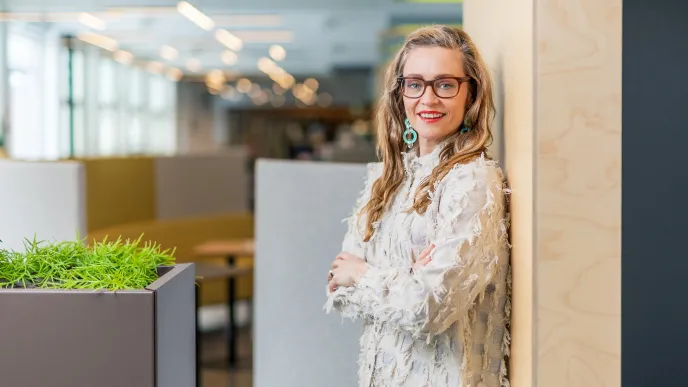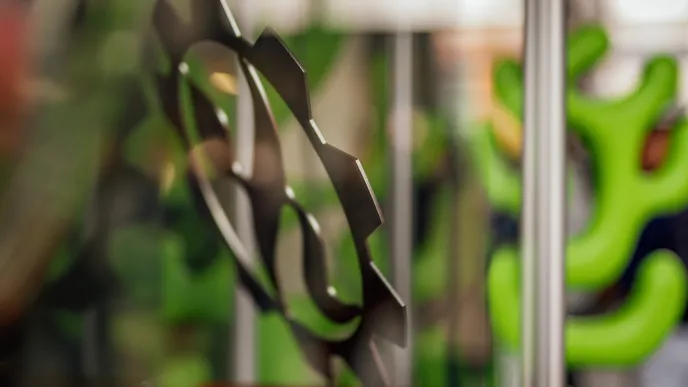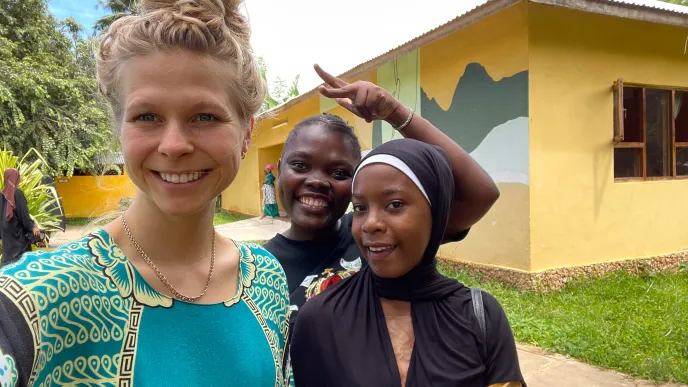Heels click on the sidewalk as people walk quickly. Many are holding a warming cup of coffee to go, and you can hear the sirens of fire engines in the background. The streets are littered, and the city seems slightly grungy.
New York City is, in many ways, exactly as wonderful and awful as portrayed in movies and TV series. Anna Ratala, the co-founder and CEO of the growth company Zvook, has been getting to know the city for two years now and has felt welcome from the get-go. She is still mesmerized by New York – how international, unique and fast-paced it is.
People tried to warn Ratala about how cold, tough, and highly competitive New York is for entrepreneurs – tough to the point of not worth venturing into. People also said she was crazy to bring a suitcase full of high-heeled shoes to the metropolis. "You won't be able to walk anywhere in them," they said.
"The more people tried to talk me out of it, the more determined I became. In the end, I was pleasantly surprised by how friendly people are here. No matter who I meet, they always want to introduce me to someone I might want to get to know. Americans love people with a story to tell. They jump at the chance to point out that 'hey, I once helped that lady out´," Ratala grins.
To Ratala, helpful people mean more than a neat and tidy subway.
Looking to challenge streaming service giants such as Spotify
Ratala has only ever had Plan A. That means she has had to succeed. It has also led to things quickly taking surprising turns, as they did in Singapore in 2019. That's when she made friends with her current business partner Malik Alimoekhamedov from Belgium. They came to talking about influencer marketing, which is forecasted to become a 15 billion dollar industry by 2022 in the US alone. Podcasters are becoming increasingly influential.
Ratala told Alimoekhamedov that she recently made a podcast with her friends and tried to find a suitable commercial partner for it, but the task turned out surprisingly difficult. Ratala and Alimoekhamedov started talking about why there was no tool for the purpose.
Ratala's and Alimoekhamedov's startup Zvook now seems to be the only service provider of its kind in the world. Zvook is a platform that uses algorithms to match brand advertisers with influencers based on their budget and customer target group. The platform finds a suitable advertiser for a podcast in mere seconds. Ratala describes Zvook as an influencer marketing continuum in a new channel.
Ratala says Zvook aims to challenge audio streaming giants such as Spotify.
"People are tired of staring at screens. More and more people choose to put on headphones and listen to audio content such as podcasts. There are nearly two million podcasts in the world, and 17 000 new ones pop up each week. Podcasters are becoming influencers, and we are providing them with tools for it," Ratala relates.
Two years ago, Zvook amounted to only one PowerPoint presentation, and now it is a company that made its first turnover in February 2021. Its clients include large corporations such as Panasonic but also many smaller ones.
"Podcasts are becoming wildly popular. Considering their demand, it's surprising that marketing services like Zvook's have not been available before."
How to budget money that does not exist?
Anna Ratala founded Slush Singapore in 2016.
Slush is a Finnish technology and growth company event with its main events in Helsinki and China and smaller spin-offs in over 40 cities worldwide. According to the Kauppalehti periodical, Slush Helsinki attracted a record-breaking 25 000 participants in 2019, and its turnover soared to 12.2 million euros.
Ratala says she had no idea what she was getting into when she started out with Slush Singapore. She had never arranged a similar event before, and the schedule was tight. She practically started from zero. To make matters more difficult, Ratala had to budget money that did not exist. She maxed out her credit card and paid 10 000 euros to rent a beach bar to host international investors only to find out that Wi-Fi was not included in the rent.
The first year was emotionally taxing for Ratala, with 150 new Slack messages on her phone every morning – not to mention other messages and phone calls. She had to be prepared for last-minute cancellations from speakers and other surprises at any given moment. Because Slush events are largely put together by volunteers, the responsibility for the large number of people committed to the event also weighed heavily on Ratala's mind.
The dates had been released, and there was no backing out.
"It was like being in a pressure cooker. My brain was always processing something. I cried into my pillow at night and kept waking up to a feeling of anxiety. Meanwhile, as a leader, I had to be able to boost people's confidence and morale. Leaders cannot afford to show signs of wavering. I can tell you right now that after Slush Singapore, no challenge has seemed like a big one."
Nonetheless, Ratala was able to get enough sponsors and the event was a success.
"Afterwards, people told me that Slush Singapore was the best event they had attended. It felt insanely good to hear. After that experience, I also learned to develop my own coping mechanisms and allowed myself one day off a week."
Ratala feels that leaders need to remember to be grateful for the opportunity to solve problems that others do not encounter.
"Not everyone gets to do things at this level. It is good to acknowledge that your own choices have led you there and you need to embrace the challenge."
People need to choose what they want to include in their life.
"When you are content with your life, you do not need to envy others."
Someone is always at the top – it might as well be you
"I was always the wild card in my circle of friends," Ratala admits.
Ratala did not play with dolls as a child. Instead, she used to dress up as a businesswoman, wearing a suit and typing away on her typewriter. She says she has always been competitive and that praise and recognition motivate her. She enjoys challenges and becomes defiant when someone tries to hold her back.
"Nothing I do surprises my friends anymore," Ratala laughs.
When Ratala was only 23 years of age, she ran for the municipal council of Lappeenranta in the 2008 election and was elected. Ratala says she twice made an initiative on the live streaming of municipal council meetings. The initiative passed the second time around. She got swept up by politics and would have run for the national parliament had she not moved abroad.
Nonetheless, Ratala had discovered that influencing issues through politics is often painfully slow.
"When I was younger, I never though I'd become an entrepreneur. Later, however, I realized that I can make a difference by starting my own firm. I can turn it into whatever I want. Moreover, people want to listen to corporate leaders."
Ratala wants to keep telling her story and hearing the stories of others.
"People buy people. I think it's important to let people know who I am through social media, for instance. Investors invest in the person, not only the company."
Ratala says she has trouble relating to entrepreneurs who play the victim. Entrepreneurs who feel they need to sacrifice friendships or a relationship are in the wrong place.
"I wish more Finns ventured abroad to take over the world. Someone always makes it to the top! And you can always go back home lots of experiences and contacts richer."
A degree does not define you, but it teaches you
Finns often emphasize the importance of education. During her international years, Ratala has seen that people amount to more than their degree. Education for the sake of education is not necessary.
"It is true that as a young woman, my Master's degrees give me certain credibility. People do not look down on me as easily. But the fact remains that no education has prepared me for entrepreneurship as much as practical experience has. I could have gotten by with much less cramming."
Ratala says that education may be useful to many, but entrepreneurs essentially need to be bold and gutsy. If you lack those qualities, no degree will help you. For an entrepreneur, the most important thing is to have good networks and to establish new contacts continuously.
"LUT taught me to see things through. My studies at LUT were an amazing period in my life; the sense of community on campus is something unique. Lappeenranta will always be the place I call home."
Ratala has spent the past 11 years abroad. Her parents live by the Mediterranean in Alicante, Spain. Ratala is spending her summer there.
"I just had a six-hour strategy meeting with my team. But I've had time to enjoy some tapas and wine too," Ratala beams.
Ratala's international network of friends and contacts consists of highly different personalities, but they also have a great deal in common. Ratala says she has found her pack during her travels.
"In another country, you make friends in different circles and diversity is highlighted. It inspires you in a different way than socializing with people who remind you of yourself. My story is a crazy one, but I've noticed that I'm not the only one who is a little crazy – there are actually a lot of us out there."
Ratala points out that her way of life would not suit everyone. She practically lives out of a suitcase, her lease agreements are short, and her nights may be lonely.
"Be that as it may, it's never too late to pursue your dreams overseas. It may even be easier in your thirties or fifties when you know who you are and what you want."
Further reading:
Get to know us
- Sami Saarenketo was supposed to become a rock star but commands the stage as a modern dean
- This is the man who took the LUT School of Business and Management to the world – Kalevi Kyläheiko is a character everyone remembers
- ”It’s been a wild ride,” says LUT University’s education reformer, Vice Rector Jaana Sandström, and reins in a stallion
- ”If no one gets angry, nothing will change,” says business influencer Tuomo Rönkkö
Studying at LUT University
Anna Ratala
- Born in St. Petersburg, residing in New York City.
- Moved to Finland at the age of 6. Has lived abroad for the past 11 years.
- Co-founder and CEO of Zvook.
- Founder of Slush Singapore.
- Has worked for the Meltwater Group as a sales manager, sales consultant and copywriter and has run her own consultancy in the Asian market.
- Executive MBA (Aalto University, 2015), Master of Economics and Business Administration (LUT University, 2010).
- Member of the Lappeenranta municipal council 2009–2010 (election 2008).
- Editor-in-chief of student association Enklaavi's paper during her studies at the LUT School of Business and Management.
- Relaxes by doing sports and enjoying good food and wine in good company.
The LUT School of Business and Management turns 30 in 2021. To mark the occasion, we are publishing interviews with the school's former and current employees with alumni.








